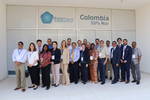Brazil
Brazil is currently developing initiatives to strengthen the institutional and regulatory arrangements for the shrimp trawl fishery. These include: creation of the Standing Consultative Committee for the Management of the Shrimp Fishery, with its Scientific Subcommittee, and the formulation of the National Management Plan for the Sustainable Use of Marine Shrimps. The objective of the first initiative was to allow for co-management by giving fishing companies, fish workers’ associations and other stakeholders the opportunity to participate regularly in the decision-making process related to the management of the shrimp trawling fishery together with all relevant government bodies. The second initiative aimed at creating the basis to guide the management process. In addition, Brazil has several major policies and programmes that support and strengthen the artisanal fisheries sector.
For Brazil, the project will be a milestone towards the implementation of the ecosystem approach in the shrimp trawl fishery in the region, ensuring this important fishing activity can be done in a more selective and sustainable manner.
During the first phase of the REBYC Project in Brazil, the “baseline” for the present situation of the bycatch and discards in the shrimp trawling fishery was assessed in the 4 pilot sites: Pará State, in the north, Pernambuco State in the northeast; Paraná, Santa Catarina/ MPA Anhatomirim, and Rio Grande do Sul, in the south and southeast. Information included the main species caught, the amount of the bycatch and proportion discarded, and impacts of the trawling on the sea floor and benthic community. A socioeconomic assessment of the shrimp trawling fishery, with a focus on the use of the bycatch and the role of women was also carried out. Different models of Bycatch Reduction Devices are now being developed in all pilot sites, with some significant reduction of the bycatch.
Recent news from Brazil











